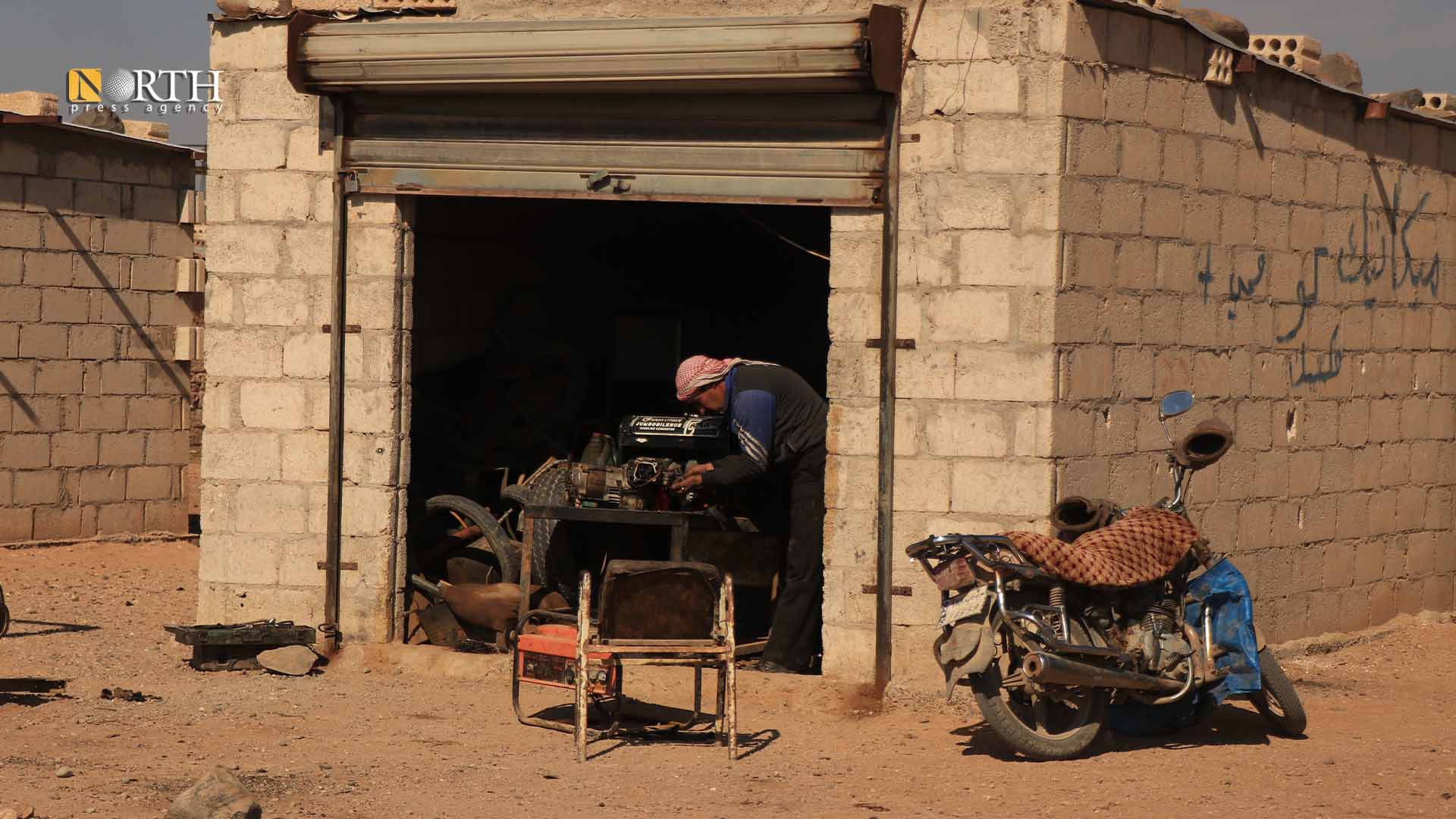TAL TAMR, Syria (North Press) – With a threadbare and grease-stained clothes, Abdurrahman Khalaf, a 44-year-old mechanic is busy repairing a power generator in his small auto repair shop in his village in Tel Tamr town in the north of Hasakah, northeast Syria.
Khalaf hopes to earn some money by repairing the generator to provide for his family as his business slows down.
Getting a well-paid job has become very difficult for the locals of Tel Tamr whose villages situate on the contact lines with the Turkish forces amid the decline of the agriculture and livestock sector due to deficient of rainfall and difficulties of purchasing fodder.
Alongside hundreds of villages in Tel Tamr northern, western, and eastern countryside, low-income people depend on mini shops for living.
However, the recurrent bombardment by the Turkish forces and Turkish-backed Syrian armed opposition factions, stationed on the outskirts of Tel Tamr since 2019, caused thousands of villagers to fled their homes on the contact lines and other villages have been totally empty of its residents.
The shelling pushed many people, who did not displace and stayed in their villages, to close down their shops and face business stagnation as buying and selling have sharply declined.
Poor work
Khalaf and one of his neighbors sit in the sun in his shop in his village Ain al-Abd near the M4 Highway, 6 km away from Tel Tamr. Both watch the passersby.
Khalaf laments the poor conditions in the area. In the past, he commuted to his auto repair shop in the industrial area every day and received many clients. Now, he works in the small shop in his own village. “My work used to be good,” he told North Press.
Following the Turkish military actions against Tel Abyad and Sere Kaniye (Ras al-Ain) in late 2019 and the frequent shelling of the villages of Tel Tamr, business stagnated. As a consequence, Khalaf was forced to shut down his shop in the industrial area failing to pay the monthly rent.
Then, he opened his small shop in the village. “Here, there is no hustle and bustle. Mostly, clients ask me to work promising to pay later, but they postpone paying me due to their poor financial conditions.”
Khalaf said the Turkish bombardment was the key reason business slowed down in his village as many clients displaced to the IDP camps or to other areas in northeast Syria.
With a red scarf and a thick moustache, Khalaf said the northern area of Tel Tamr became semi-empty and this affected the numbers of clients visiting his shop.
Apart from his small shop, Khalaf has got some cattle but he is compelled to sell one sheep from time to time to sustain his family. “I even borrowed some money from some relatives to provide for my family.”
Closed shops
Passing by the northern villages situated on the contact lines, passersby find the majority of the shops are closed as owners have fled due to the recurrent shelling or the poor economic situation.
Silence prevails in the villages that were once full of life, children’s shouts disappeared and the elderly no longer sit in front of their houses to chat.
In his live chicken shop in Majirah Zargan village, north of Ain al-Abd, the 28-year-old young man Muhammad Shahin is busy using his mobile phone as selling chicken has almost stopped.
The Turkish continuous bombardment has paralyzed the buying and selling because the majority of the people displaced, Shahin said.
Prior to the shelling, Shahin sold six coops of live chicken, now he hardly sells only one.
The majority of Majirah Zargan’s people displaced to Newroz Camp in Derik in the far northeastern Syria. 50 families lived in the village in the past but now around 15 families left, according to local people.
The difficult economic conditions put the people at great challenges. “The money I earn every day is barely enough for my family.”

